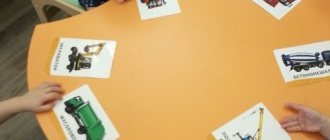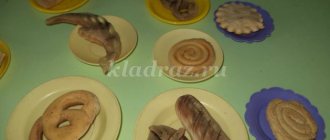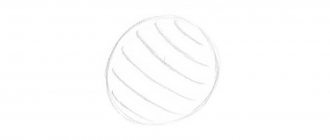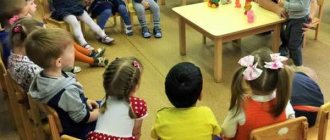Lesson notes on the social world in the middle group. Topic: “Health School”.
Lesson notes on the social world in the middle group.
Subject: "
School of Health".
Target:
- Strengthen knowledge about the senses; clarify the importance of hearing, vision, taste, smell and touch for a person in understanding the world. Learn to convey various emotional states.
- Promote the development of attention, logical thinking, memory and imagination.
- Foster the need to be healthy and take care of your body.
Material and equipment:-
pictures depicting sensory organs; blindfold scarf; “wonderful bag” with a set of small items; cups with scented items, napkin.
Progress of the lesson
IN:
Children, today we are going to the School of Health. We will visit different laboratories where research is carried out on human sensory organs. What sense organs do you know? (Children's answers.) That's right, these are eyes, ears, nose, tongue, hands. They help us understand the world around us, and that is why we call them our assistants. Let's go to the first laboratory. I will tell you a riddle, and after you guess it, you will understand what sense organ is being explored here.
Two windows at night
They close themselves
And with the sunrise
They open on their own. ( Eyes.
)
Yes, they study vision in this laboratory. Why do people need eyes? (Children's answers.) That's right, we see the world with our eyes. In order for your eyes to see well, you need to do special gymnastics.
Visual gymnastics complex
.
1. Close your eyes for 3-5 seconds, then open them wide. Repeat 6-8 times.
2. Blink quickly for 10-15 seconds. Repeat the exercise 3 times with an interval of 7-10 seconds.
3. Rub your palms together and easily, without effort, place them on your previously closed eyes for 30-40 seconds. Then lower your hands and open your eyes.
IN:
We enter the second laboratory. Guess the riddle:
Two brothers live on one head,
They hear everything, but don’t see each other. ( Ears
.)
Yes, this laboratory studies the organs of hearing. (Speaks quietly.) Squat down, stand up. (Children do.) Why did you sit down and stand up?
Children:
Because they heard what you said.
IN:
How did you hear it?
(Children's answers). What rules must be followed to ensure that your ears hear well and do not hurt? (Children’s answers.) (“Basic rules”, G. Zaitsev “Lessons from Moidodyr”, p. 11). And now, so that our ears can hear well, let's play the game “Recognize by voice” .
(Everyone stands in a circle, leading the child in the center. Children, holding hands, walk in a circle and say:
Alyosha (Sasha, Masha, etc.),
You're standing in a circle
We call you: “Ay!”
Close your eyes
Find out who called you!
The driver closes his eyes. One of the players calls his name. The driver must determine by voice who called him.
IN:
Let's move on to the next laboratory. To find out what they do here, guess the riddle:
Between two luminaries in the middle I am alone. ( Nose
.)
Children guess the riddle and answer the teacher’s question about why a person needs a nose.
Breathing exercise
. Inhale deeply through your nose and exhale slowly. Repeat 3-4 times.
Let's play the game "Recognize by Smell."
With their eyes closed, children are asked to identify by smell what is in the cups. (Chocolate, orange, onion, lemon.)
IN:
How else can you determine what kind of product it is without seeing it? (To taste.)
In the next laboratory they study this particular sense organ - the tongue. The surface of the tongue has areas, each of which perceives a specific taste. Tell me, what is sweet (bitter, sour, salty)? (Children's answers.) Let's play with the language.
Articulation gymnastics.
- "Cold - hot." Open your mouth slightly, place your wide tongue on your lower lip (count to 5 in your head), hide your tongue, close your mouth (count to 5). Repeat 3-4 times.
- "Swing". Open your mouth slightly, press the tip of your tongue to the roof of your mouth and slowly move your tongue up and down. Repeat 8-10 times.
- "Watch". Open your mouth slightly, touch the corner of your mouth with the tip of your tongue and slowly move your tongue left and right. Repeat 8-10 times.
- "Horse". Click your tongue.
IN:
Let's hold hands and remember the poem “How joyfully we live...”. Children (in chorus).
How joyfully we live.
We sing songs together,
We can laugh merrily
Make a joke, have fun
And sometimes argue
Well, never fight!
IN:
Well, here we are in the last laboratory.
Here they study the sense organs that are responsible for touch (sensation). Game “My ears are good, but my neighbor’s are better..”.
IN:
Let's see if we can find out what object is in the bag with our eyes closed.
Game “Wonderful Bag”
(the child is blindfolded, he must guess the object by touch). The game is repeated 4-5 times, played while standing.
IN:
So our tour of the School of Health has ended.
We talked about the importance of our senses and how they help us. And now we will smile.
Let's hold hands tightly. we will give each other farewell
(Children say good wishes to each other.)
Summary of a lesson on socialization for the middle group Topic: “So that the ears can hear”
Summary of a lesson on socialization for the middle group Topic: “So that the ears can hear” Tasks.
Strengthen children's knowledge about vision; introduce children to the structure of the ear and the basic rules of ear care; expand and activate children’s vocabulary on this topic; improve speech in the form of dialogue (when children show a skit); work on the expressiveness of performance; develop memory, auditory attention, speech hearing, hearing acuity.
Material.
Drawn Dunno; illustrations on ear care for each child; objects, toys, screen, scarf for games; poster with pictures; ear diagram.
Progress of the lesson
1. - Guys, we have guests today. And who came with the guests? Of course it's Dunno! Guys, Dunno has friends, and they live in the country of Big Guys. Do you know what kind of country this is? (children's answers) But our Dunno cannot yet live in such a country. Why do you think? (children's answers). Of course, guys, Dunno knows nothing about her body and doesn’t know how to take care of her health. But it seems to me that you and I can help Dunno. Do you agree or not? (children's answers)
2. - Dunno, at the last lesson the guys and I learned that a person’s main assistants are (the eyes). The eyes are an organ of what? (vision). Let's remember and tell Dunno what we can do thanks to vision? (children's answers). What color are Dunno's eyes? (blue). Which part of the eye did you use to determine the color? (by iris)
- Guys, Dunno’s friends gave him this poster with pictures, but he doesn’t know why they gave it to him. Let's look at the poster and try to explain to Dunno. (children talk). This poster and pictures tell Dunno that she needs to protect her eyesight. With the help of good vision we perceive most of the world around us. Don't forget about this poster and take care of your eyesight!
3. - And now you and I will play again and recognize other human helpers.
- And you, Dunno, watch carefully what the children will do, listen and remember what they will talk about.
Game “Name it, don’t make a mistake”
- I will come up to you and touch different parts of the body, whoever correctly names the body part and quantity will sit on a chair.
Game “Recognize an object by sound”
- Here is a screen, objects are hidden behind it. We will recognize them by their sounds. It should be quiet - quiet in order to better hear and determine what object the sound relates to.
- Whoever guesses, clasp your hands. (You can call several children to tell the teacher quietly whose sound they heard).
Game "Guess whose voice?"
“I walk around the house
And I look out the windows. I’ll go up to one and quietly call. Guess the riddle, find out who called you!”
- How did you recognize the children’s voices, what object does the sound relate to? (we heard). What helped you find out? (ears). The ears are the organ of hearing. (children repeat)
“You listened, you heard, and your hearing helped you!”
- What benefit does hearing bring to a person, what sounds does hearing help to hear? (for example, at home, on the street...)
- Yes, guys, with the help of hearing a person hears all the sounds that fill our world (surrounding)
- And it is especially important for a person to hear other people’s speech. After all, with the help of words we communicate with each other, convey our thoughts and knowledge.
Physical exercise.
4. - And this is how it turns out that a person hears. How our ear works. We'll get to know each other now and take a look.
— The visible part of the hearing organ is the external auricle. It determines where, i.e. from which direction the sound or sounds are coming. Next, auditory signals enter the external auditory canal. The pinna and auditory canal form the outer ear. Next, the signals enter the middle ear, which consists of the eardrum - a dense, leathery membrane - and three bones. The sounds then travel to the inner ear. From the inner ear, signals travel to the nerves and then to the brain. There the signals are transformed into words and sounds understandable to humans.
— Guys, there are many points on the auricle that are connected by invisible threads to all our organs (heart, liver, stomach, etc.).
- Therefore, it is good to do self-massage of the ears. You and I know how to do it, let’s teach Dunno.
Wellness moment. (self-massage of ears)
“I will save my health, I will help myself.”
5. — The organ of hearing is the ears. With the help of our ears, we distinguish the voices of animals, the sound of rain, the babbling of a stream, music and human speech.
- Plug your ears with cotton wool. What happened? (children's answers). All sounds immediately disappeared, you stopped hearing.
— To keep your ears from hurting and your hearing to always remain good, you need to know and follow the basic rules. What are these rules? Now, looking at the pictures, tell me yourself.
Protect your ears from cold and strong winds;
Protect ears from noise;
Do not pick your ears;
Avoid getting water into your ears;
Do not blow your nose too much;
If your ears hurt, consult a doctor!
- And also, guys, in order to have good hearing, you need to be able to clean your ears properly. Now go to this table and select those objects with which you can clean your ears (children explain).
“If you guys take care of your ears properly, then you won’t have to see a doctor.”
6. — Guys, your hearing picks up loud sounds, quiet, calm speech, but can your hearing pick up whispers? Dunno and I will now check the acuity of your hearing.
Game "Deaf Phone"
(words: toy, mouse:)
- Well done guys, your hearing is good. Really, Dunno? (yes) Hearing is of great value to a person. Don't forget and take care of him!!!
7. — Guys, besides humans, who else has a hearing organ? (in animals) Why do animals need good hearing? Ears help animals catch prey, escape from enemies, and find each other. Do you know which animal has good hearing? (children's answers). Of course, it is known that animals with large ears hear better. (Hare, deer, elk, roe deer)
“You see how important it is to have good hearing not only for humans, but also for animals.
- Now tell me, what kind of human assistants did we meet? (vision and hearing)
- Right. Dunno, in the next lesson the children and I will continue to get acquainted with our body. We invite you too.





